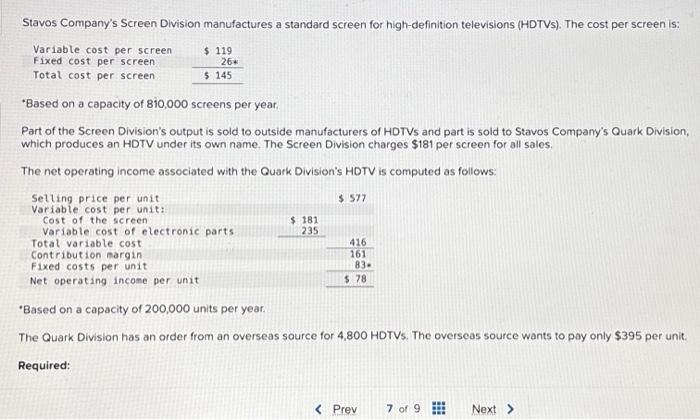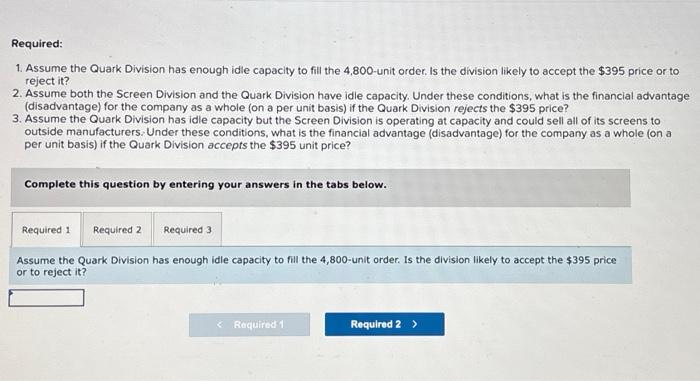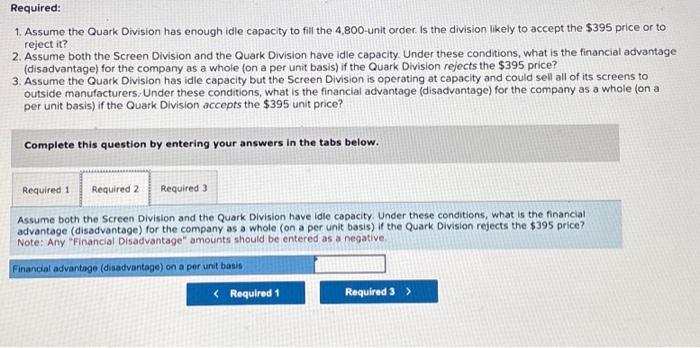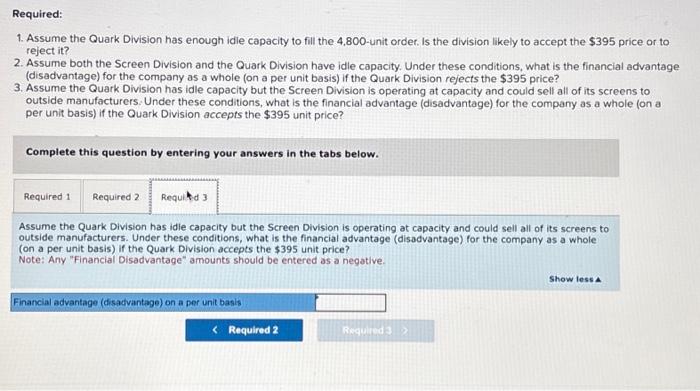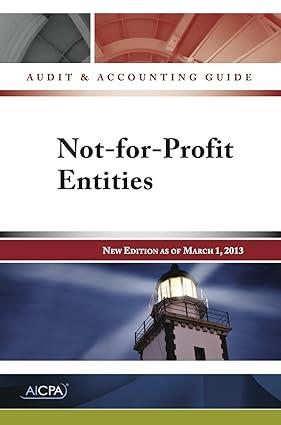Required: 1. Assume the Quark Division has enough idle capacity to fill the 4,800 -unit order. Is the division likely to accept the $395 price or to reject it? 2. Assume both the Screen Division and the Quark Division have idle capacity. Under these conditions, what is the financial advantage (disadvantage) for the company as a whole (on a per unit basis) if the Quark Division rejects the $395 price? 3. Assume the Quark Division has idle capacity but the Screen Division is operating at capacity and could sell all of its screens to outside manufacturers. Under these conditions, what is the financial advantage (disadvantage) for the company as a whole (on a per unit basis) if the Quark Division accepts the $395 unit price? Complete this question by entering your answers in the tabs below. Assume the Quark Division has enough idle capacity to fill the 4,800 -unit order. Is the division likely to accept the $395 price or to reject it? Required: 1. Assume the Quark Division has enough idle capacity to fill the 4,800 -unit order. Is the division likely to accept the $395 price or to reject it? 2. Assume both the Screen Division and the Quark Division have idle capacity. Under these conditions, what is the financial advantage (disadvantage) for the company as a whole (on a per unit basis) if the Quark Division rejects the $395 price? 3. Assume the Quark Division has idle capacity but the Screen Division is operating at capacity and could sell all of its screens to outside manufacturers, Under these conditions, what is the financial advantage (disadvantage) for the company as a whole (on a per unit basis) if the Quark Division accepts the $395 unit price? Complete this question by entering your answers in the tabs below. Assume the Quark Division has idle capacity but the Screen Division is operating at capacity and could sell all of its screens to outside manufacturers. Under these conditions, what is the financial advantage (disadvantage) for the company as a whole (on a per unit basis) if the Quark Division accepts the $395 unit price? Note: Any "Financial Disadvantage" amounts should be entered as a negative. Show less A Financial advantage (disadvantage) on a per unit basis 1. Assume the Quark Division has enough idle capacity to fill the 4,800 -unit order. Is the division likely to accept the $395 price or to reject it? 2. Assume both the Screen Division and the Quark Division have idle capacity. Under these conditions, what is the financial advantage (disadvantage) for the company as a whole (on a per unit basis) if the Quark Division rejects the $395 price? 3. Assume the Quark Division has idle capacity but the Screen Division is operating at capacity and could sell all of its screens to outside manufacturers. Under these conditions, what is the financial advantage (disadvantage) for the company as a whole (on a per unit basis) if the Quark Division accepts the $395 unit price? Complete this question by entering your answers in the tabs below. Assume both the Screen Division and the Quark Division have idle capacity. Under these conditions, what is the financial advantage (disadvantage) for the company as a whole (on a per unit basis) if the Quark Division rejects the $395 price? Note: Any "Financial Disadvantage" amounts should be entered as a negative. Financiat advantage (disadvantage) on a per unit basis Stavos Company's Screen Division manufactures a standard screen for high-definition televisions (HDTVs). The cost per screen is: "Based on a capacity of 810,000 screens per year. Part of the Screen Division's output is sold to outside manufacturers of HOTVs and part is sold to Stavos Company's Quark Division, which produces an HDTV under its own name. The Screen Division charges $181 per screen for all sales. The net operating income associated with the Quark Division's HDTV is computed as follows: "Based on a capacity of 200,000 units per year. The Quark Division has an order from an overseas source for 4,800 HDTVs. The overseas source wants to pay only $395 per unit. Required
